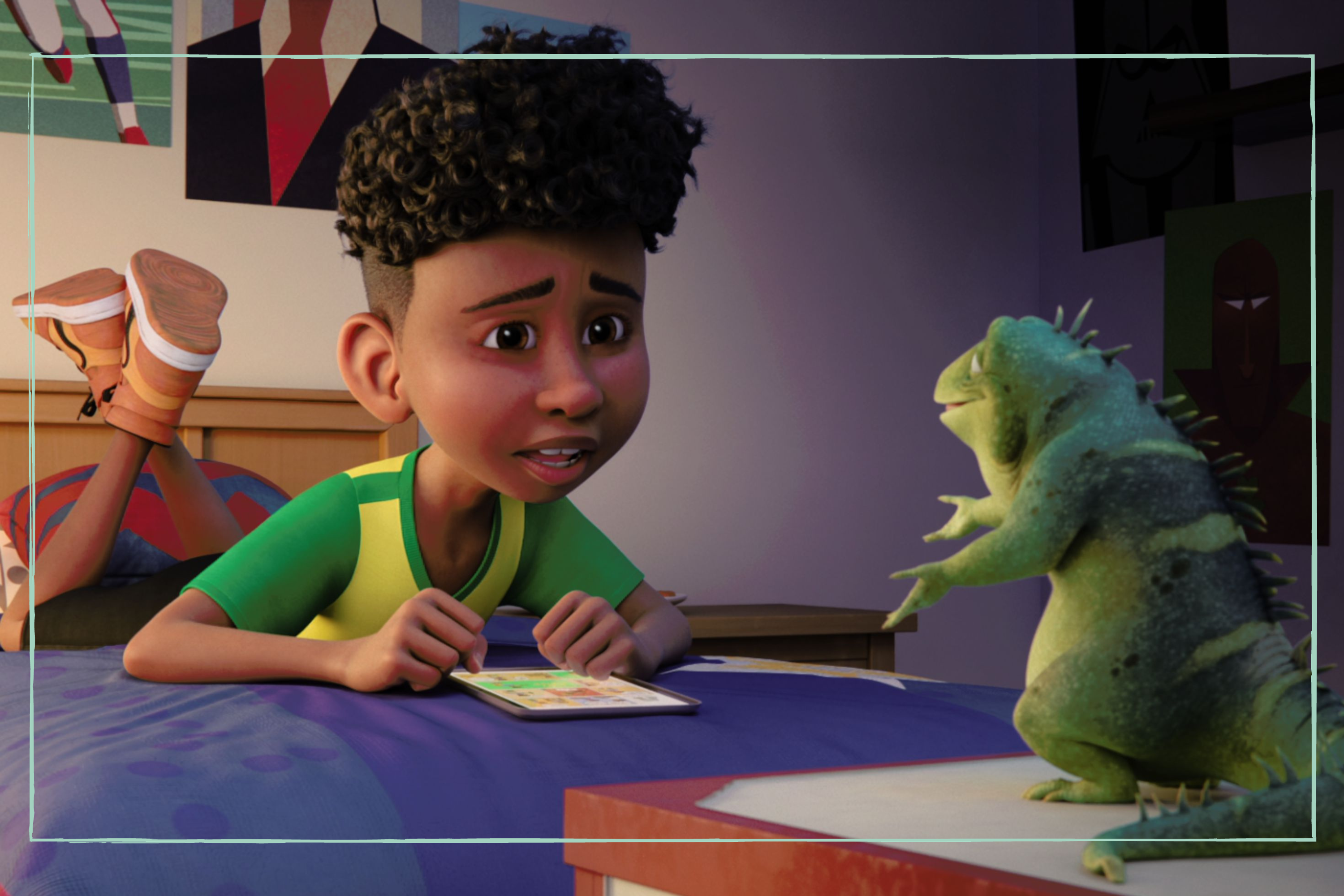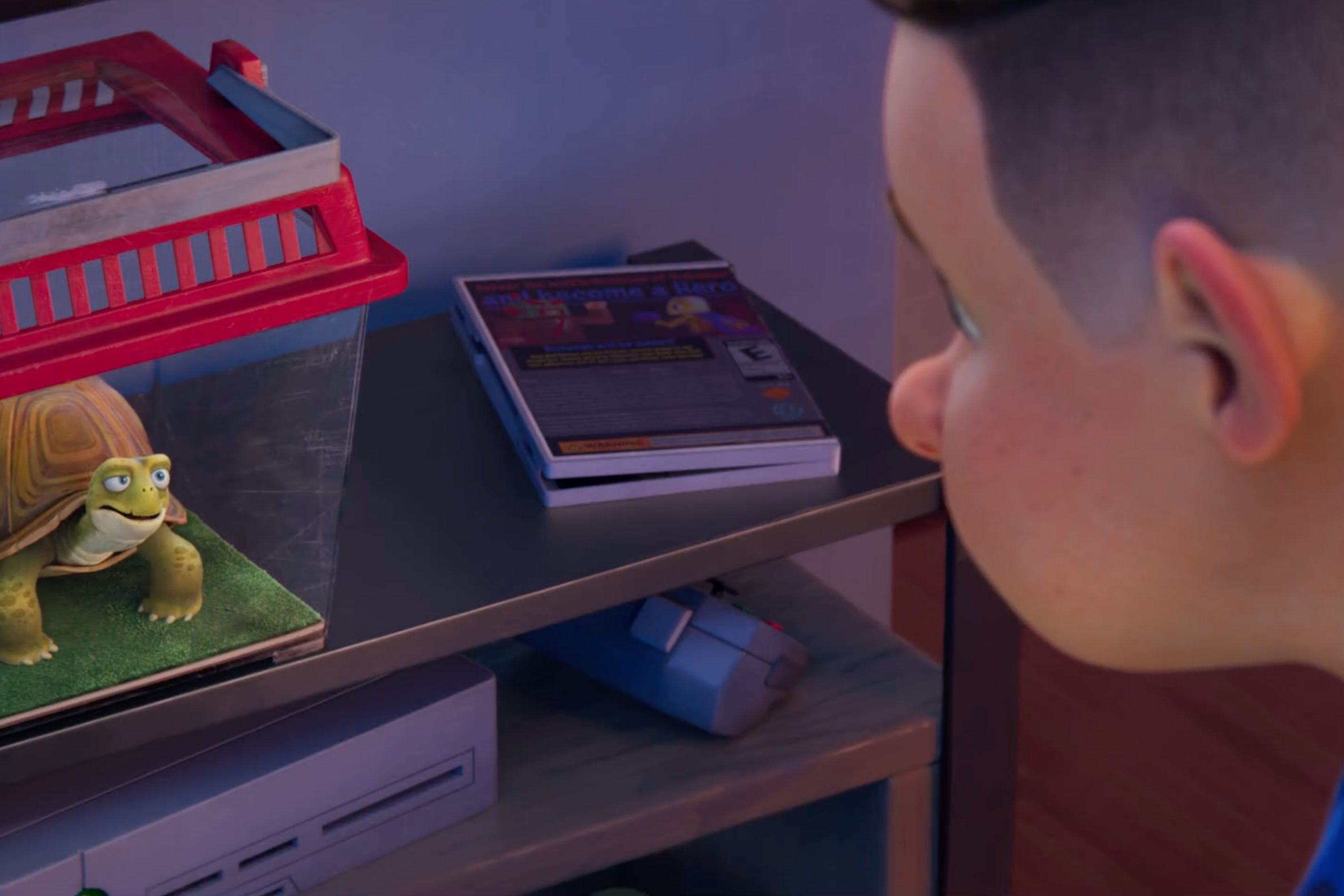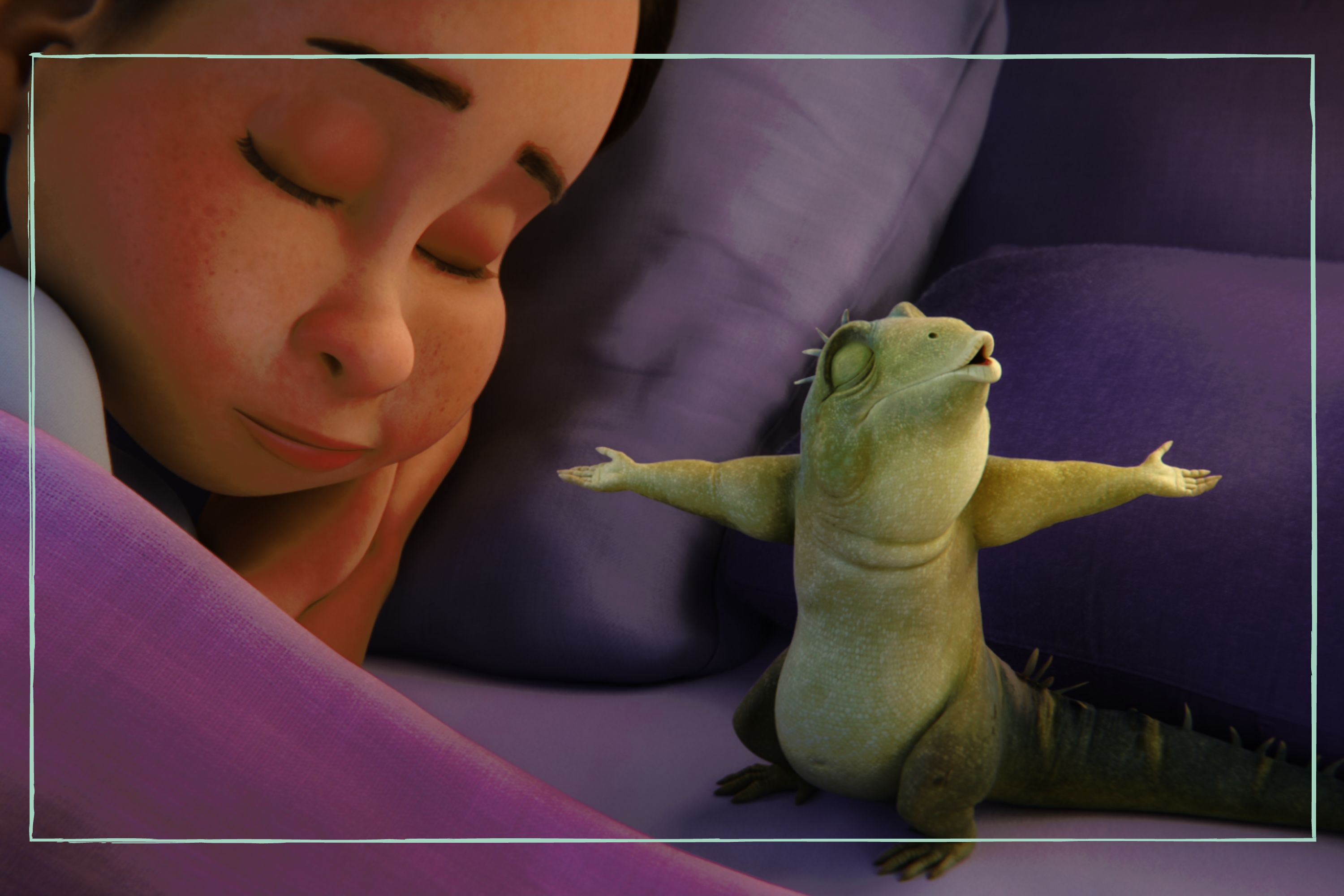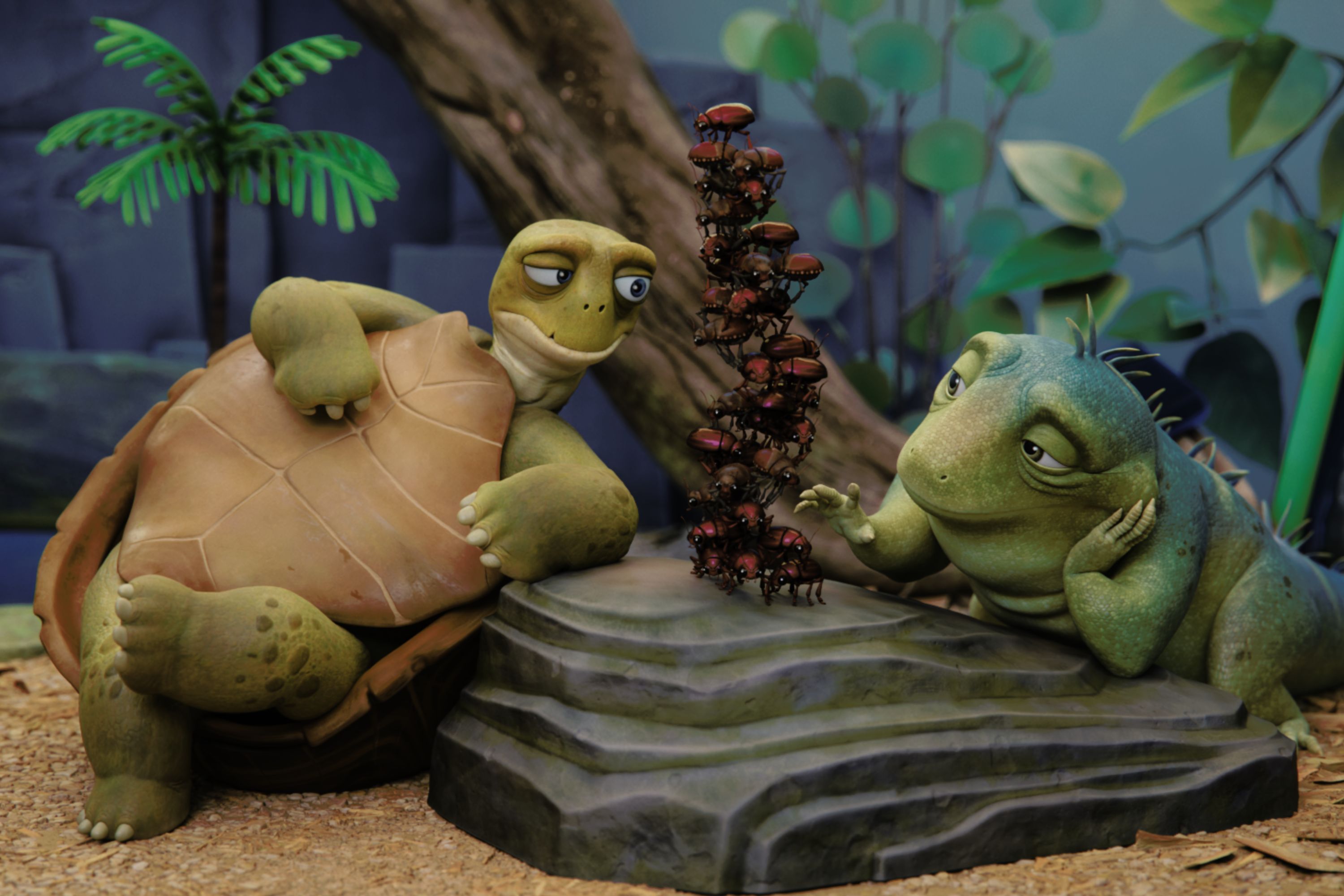15 ways Netflix’s Leo tackles the anxieties of modern parenting - and #9 is an important lesson for everyone
It's making both kids and adults feel seen


Modern parenting is certainly a challenge, and a Netflix animated kids film is tackling those uncertainties head on with humour and heart.
It’s one of the best films for kids on Netflix right now - and the most viewed. Leo is the latest coming-of-age animated musical comedy featuring the voice of Adam Sandler. When a 74-year-old class pet lizard realises he might be arriving upon his final days, he makes a bid to escape the classroom and live his remaining time in freedom. By doing this, Leo inadvertently ends up helping his anxious students while experiencing a bucket list that was never quite part of his plans.
Here's how the movie helps both children and adults manage difficult feelings and conversations around mental health.
How Leo tackles the anxieties of modern parenting
1. Addressing social boundaries in a fun way
Traditionally and in what is now a completely outdated mode of thought, children were seen and not heard. Modern parenting now encourages curiosity, asking questions, and allowing children the freedom to express themselves - which means an increase in chatter. However, alongside this, there are the 'expected' socially accepted norms such as listening and use of perceptible cues to understand when to stop talking and when a conversation has reached a natural conclusion.
On an overnight stay at a student's home, Leo realises student Summer is unsure of managing such social boundaries. She uses talking about herself as a coping mechanism, despite taking in body language indicators suggesting others might find her 'annoying.' Leo teaches Summer that it is ok to be herself, encouraging her to aim questions to her peers to turn the direction of her conversation elsewhere. In doing so, he paves the way for discussions parents can have with their children about dealing with social awkwardness, and other reasons children might find conversation difficult - this can be also be attributed to a range of neurodiversity and behavioural issues, which children might already be aware of, and want more information about.
2. How closely we should monitor our children
Another student, Eli, has such extreme allergies that his mother has placed him under constant surveillance. Like a true helicopter parent, she has him followed around by a drone that performs activities for him she deems dangerous, or mean he might have to touch potential allergens. Essentially, the drone is a metaphor for how much parents should interfere in their children's lives. In one hilarious scene, she even places him in a hazmat suit for a play date, to avoid him coming to any harm - which parent hasn't wanted to do that when they've heard the latest bug is going around, but don't want to stop their kids having fun?!
Modern parenting gives us similar, although slightly less extreme, access to our children at all times - their phones can be tracked, and if they don't have phones, other trackers can be placed in their bags. Knowing where our children are and what they're doing has become normal, when it never has before. Eli comes to resent the constant intrusion of his mother in his life, and there needs to be a balance. The film shows parents they know their children best, and can work with them to reach a shared understanding about how much freedom to give and when.
Parenting advice, hot topics, best buys and family finance tips delivered straight to your inbox.
3. When adults need to become involved in problems
Children can sometimes work through problems alone, or with the help of close friends. When Leo spends the night at Eli's house and Eli discovers he can talk, Leo pleads with him not to tell anyone. "But my parents told me when someone says 'don't tell anyone,' is when I have to tell someone," is Eli's bemused response.
This is indeed, the right thing to do. It also reinforces the message that if children ever feel uncomfortable about anything, they should always reach out to a trusted adult - not matter what they've been told the consequences might be if they do. The film reiterates that reaching out about any worry at all, is better than keeping it inside.
4. Navigating the complexity of friendships
When parties are organised via social media and pictures of the event are subsequently shared there, the feeling of being left out can be even more cutting. Watching the popular Jayda discussing who will be invited to her 'exclusive' party, and who will be left out, would have brought back memories for anyone who experienced that 'mean girl' culture when they were at school.
Conspiratorially handing an invite to the socially awkward Summer was not how we thought the scene was going to play out - Summer was, of course, delighted to be included. After a chat with Leo causes Jayda to then invite the entire class to the party, her acceptance of having her everyone there no matter what she thinks of them made us whoop with joy. A bit of inward looking and self-reflection brought valuable lessons that we don't have to get on with everyone, and it's how those difficulties are managed with kindness that matters.

5. Not to replicate mistakes of the past
As we suggested, navigating friendships at school is an age-old issue - what requires addressing is teaching our children not to replicate the behaviours of our own childhood. Floundering around in an attempt to understand the dynamics of relationships around you is something a lot of people will remember from their own days in the classroom. The psychological power struggle of cliques can even carry on to mums at the school gates.
As Leo shows, and is backed up by research, girls are more likely to engage in 'relational aggression'. This includes manipulation that threatens or destroys another's relationships, feelings of acceptance or group inclusion. It has been suggested that this type of bullying often goes unnoticed and ignored, and is therefore easy to perpetuate generation after generation. Leo shows us that it's time to smash that negative cycle and equip our kids with the skills to be kind and inclusive.
6. Parents should be considerate of teachers
Parents now have unprecedented access to school, and their child's teacher. They are also now encouraged to take a more active part in their child's education and development. These are both positives, we definitely concur. However, it also paves the way for teachers to be bombarded with emails from parents, with a recent report suggesting parents are frequently challenging rules set by them.
Leo touches on this, with a disgruntled set of parents complaining aggressively to the headteacher about the children's substitute teacher. They want her gone because their daughter doesn't like her and her old-school teaching methods. Watching this altercation unfold offers the perfect opportunity to reflect on the pressure teachers are under and how much this is exacerbated by the ability to launch multiple complaints at them like missiles. Parents fostering positive communication with schools sets a great example and gives kids the opportunity to learn by example - everyone's a winner!
7. How much pressure we put on our children
Leo see first-hand the pressure Jayda is under to be 'amazing.' Her brag-prone father wants his children to excel at everything, while her perpetually yoga-practicing mother is often too distracted to listen to her daughter's concerns. Jayda reveals to Leo just how difficult she finds living up to their expectations, and is shocked when he tells her she isn't that great - we were also shocked but hold that thought, there's a teachable moment here.
Instead, he supports her in understanding that just being herself is what makes her a superstar, and it's not the standards set by her parents that define her. In turn, Jayda feels a freedom she's never found before, and basks in the glory of just being Jayda. Inviting all the previously excluded kids to her party, means she finds them relatable in a way she never has before when viewing them with this refreshed lens. Watching this made us want to celebrate our children's quirks and individual personalities, reminding us not to push our own aspirations onto their irreplaceable uniqueness.
8. Dealing with divorce
Leo plays agony uncle to Mia, a shy girl whose parents are recently divorced. Mia is shown reluctantly getting in the car with her father and siblings, leaving her mother behind. There is clear hostility between her mum and dad as they navigate co-parenting.
Most children will see divorce in some form, whether their own parents have separated, or they have friends with divorced parents. Watching a parental split play out on screen, can initiate a range of conversations with young people. This could include how to talk to them about divorce, and the many different ways families can be structured in the modern world.

9. Adults don't always have the right thing to say
At one point when helping Mia, Leo realises that actually, he doesn't have the right words to help her. As well as dealing with her parent's divorce, Mia is upset at the loss of her grandfather, whom she describes as her 'best friend.' Alarmed when she starts crying, Leo eventually gets the smart Mia to give him a scientific reason for crying being good.
He later reveals to his classroom pet friend, Squirtle, that because he didn't know how to help, he simply listened instead. As a parent, we've all been there, experiencing multiple situations where the right words just don't come. No parent is ever going to have all the answers to their child's potentially complex problems that can arise. Listening can be the most effective form of supporting them, and something they'll find invaluable in itself.
10. It's OK to be different
During an overnight stay at the class bully's house, Squirtle is along with Leo for the ride. Hearing of Leo's exploits delivering advice to students in need, Squirtle wants in on the action. Not quite as good at this as Leo, he does get the bully to reveal he feels different to his classmates, and gives lack of understanding about important topics as a reason to use bullying for deflection.
This acts as an opportunity to identify what bullying behaviours are and what they could mean for the person carrying out it out when discussing it with little ones. Evidence suggesting insecurity is one of the top reasons people resort to bullying supports why the child Leo and Squirtle are helping has turned to it. Understanding why children feel different could help their care providers get to the route of the conflict their behaviour causes.
11. The joy in just being a child
The children in the film are beginning to become burdened with concerns young people face as they transition into adulthood. It's their final year before they head off to middle school, and puberty is a looming concern for some of them - who else remembers the horror of finding that first grown up hair on their body?
It's a stark reminder that, no matter how many times you're told the same thing by anyone willing to say it, children do grow up quickly. The days are long but the years are short, really does ring true. That short time that children are just children should be celebrated and enjoyed, before life catches up with them and they're facing tween and adult challenges.
12. How technology can be used positively
In a technology saturated world, it's easy to constantly have guilt-inducing messages about screen time and use thrown at us as parent. Leo strikes the perfect balance between depicting the use of tech positively, and negatively. There's a positive depiction when Leo wants to connect with the children from his tank when he's not staying overnight at their homes.
With a mobile placed inside with himself and Squirtle, Leo can still listen to the children and dispense advice from afar. He even learns a thing or two when Mia reads him facts down the line. This shows that phone usage can alleviate loneliness and be useful for shared learning, and isn't just another thing to add to the guilt pile.

13. Puberty can be daunting
A couple of Leo's children in need of assistance are concerned with what puberty might do to their bodies. Leo tackles this with the right amount of seriousness mixed with light hearted humour. Parents might not be aware of their children's feelings towards bodily changes, and the film acts as an opportunity for anxious children to ask questions.
At the bullying child's house, he also admits to feeling left out because he doesn't understand how babies are made. This presents a fantastic opportunity to correct any children who might believe the version of sex education Squirtle offers, which is actually the reproductive cycle of a turtle...!
14. Anxiety is normal
A lot of the topics covered in Leo ultimately relate to the feelings of anxiety that they might induce in children. Understanding what they're worried about and identifying anxious feelings is very important to young people's mental well-being. Seeing the characters on screen experience worry could be quite a relief to a child worried about similar issues.
The NHS suggests that a certain level of anxiety in children is normal, but parents will want to seek help if they notice it affecting their child's health. They have a lot of useful information about the signs of anxiety in a child, and what parents can do to help them.
15. Not everyone gets it right
Leo proves that even he isn't exempt from making mistakes, when the children all turn against him. Having told them individually that they were the only one able to hear him speak, they no longer feel special when they find out they this isn't the case. Leo is devastated when they turn their backs on him, and has his own lessons to learn.
The class teacher also makes mistakes in how she handles it when she finds out about Leo's special ability. Seeing both of them make - and learn from -their mistakes acts as a tool to show children that even adults don't get it right. In a world where the pressure is on to be the perfect parent, children have to know that adults are far from faultless and don't always get it right - and that's also ok.
For more in entertainment, we've looked at some of the top Disney Plus kids films, and if you want something a bit different to watch and want to know if Madame Web is suitable for kids, we have the info you need. A new Netflix film encourages kids to face their fears, and we've looked at how you can encourage your children to do the same, just like Orion in Orion and the Dark.

Lucy is a mum-of-two, multi-award nominated writer and blogger with six years’ of experience writing about parenting, family life, and TV. Lucy has contributed content to PopSugar and moms.com. In the last three years, she has transformed her passion for streaming countless hours of television into specialising in entertainment writing. There is now nothing she loves more than watching the best shows on television and sharing why you - and your kids - should watch them.